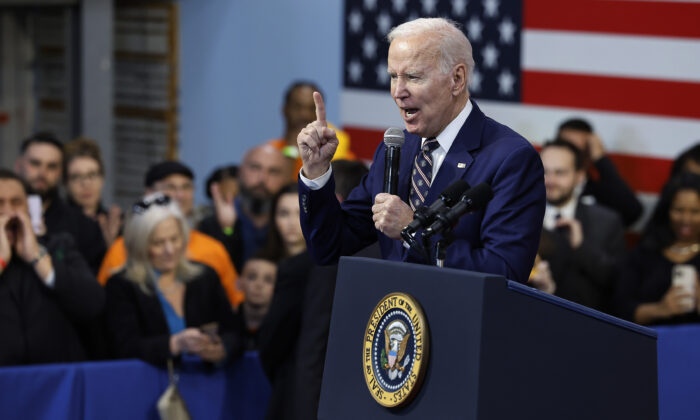
The New York Times
Should the Supreme Court agree to hear the case on the state’s ban on transition care for minors, any ruling would reverberate across the legal challenges against other states that have passed similar bans.
Transgender youth and their families in Tennessee asked the Supreme Court on Wednesday to block the state’s ban on transition care for minors, petitioning the nation’s highest court to intervene for the first time on the issue after a wave of conservative-backed legislation targeting transgender people.

The petition comes just over a month after a divided federal appeals panel allowed bans in Tennessee and Kentucky to remain in effect, adding to a complicated legal landscape for transgender children and their families. The bans prohibit minors from receiving transition care including hormone therapy and puberty blockers. Should the Supreme Court agree to hear the case, any ruling would reverberate across the legal challenges in most of the more than 20 states that have passed similar bans.
Conservative lawmakers say that the bans are necessary to prevent children from undergoing medical procedures they view as risky and unproven. But transgender people and their families have said that the laws have created a stressful and uncertain environment for them and their medical providers over care they say is essential for their well-being.
In June, a federal judge in Arkansas struck down a ban that was the first of its kind in the country. But conflicting rulings since then have further muddled access to transition care: After a series of rulings stalling implementation of the bans, some judges have allowed the laws to go into effect, at least temporarily.
The divisions between federal appeals courts makes review by the Supreme Court more likely, though not guaranteed.
The Anti-Trans Push in America
- Oklahoma: A federal judge denied a request to temporarily block a state law banning gender transition care for those under 18. The law makes it a felony crime for a medical professional to provide the care.
- Montana: A state judge temporarily blocked a law that would have banned transition care for children under 18. The ruling was the first part of a legal fight that may take years to resolve.
- Kansas: The state will no longer change the birth certificates of transgender people to reflect their gender identities, the state health department said, citing a new law that defines male and female as a person’s sex assigned at birth.
- Georgia: A federal judge allowed the state’s ban on gender transition care for minors to go back into full effect, after a federal appellate panel allowed a similar law in Alabama to be enforced.
“I’m fighting this law because I know how important this care is for tens of thousands of transgender youth like me,” said L.W., a 15-year-old from Tennessee identified only by her initials in court filings, in a statement provided by the American Civil Liberties Union. “It scares me to think about losing the medication that I need.”
Samantha Williams, the teenager’s mother, said she wanted the Supreme Court “to see and understand my daughter and recognize her rights under the Constitution like any other person.”
What matters to you in the South?
After four years writing about Congress, Emily Cochrane is now covering the South for The Times. She is eager to learn about what makes life in this changing region distinct, and to talk to people whose lives have been directly affected by laws passed in Washington. Share your ideas about our coverage.
Tennessee’s attorney general, Jonathan Skrmetti, has repeatedly defended the state ban, calling the appeals court ruling in late September “a big win for democracy.” Asked for comment, a spokeswoman said Mr. Skrmetti and his office “look forward to litigating this case to the fullest extent necessary.”
Some plaintiffs, including Ms. Williams and her daughter, have argued, with some success, that preventing the medical treatment is discrimination based on sex and a violation of a transgender patient’s constitutional rights.
The bans on medical treatment for transgender minors are part of a series of laws that legislatures controlled by Republicans have passed this year regulating various aspects of life for transgender people, including which bathrooms they can use and which sports teams they can play on, and whether students can change their pronouns in school.
That is the case in Tennessee, where the Republican supermajority in the legislature pushed through S.B. 1, a measure that prevented doctors from providing any new transition care in July and demanded the end of that care for current patients in March 2024. The law was temporarily blocked by a lower court in late June.
But soon after, a divided panel with the U.S. Court of Appeals for the Sixth Circuit became the first court to overturn a temporary block on such a ban, signaling skepticism that the law in question violated constitutional rights. After hearing arguments over both the Tennessee law and similar provisions in a Kentucky law, the appeals panel, based in Cincinnati, concluded that the majority’s initial decision stood.
The transgender minors and families who challenged a similar Kentucky law that bundled a ban on transition care with other controversial policies are expected to soon file a similar request with the Supreme Court, the American Civil Liberties Union of Kentucky said on Wednesday.
Adam Liptak contributed reporting.
Emily Cochrane is a national reporter for The Times covering the American South, based in Nashville. More about Emily Cochrane

